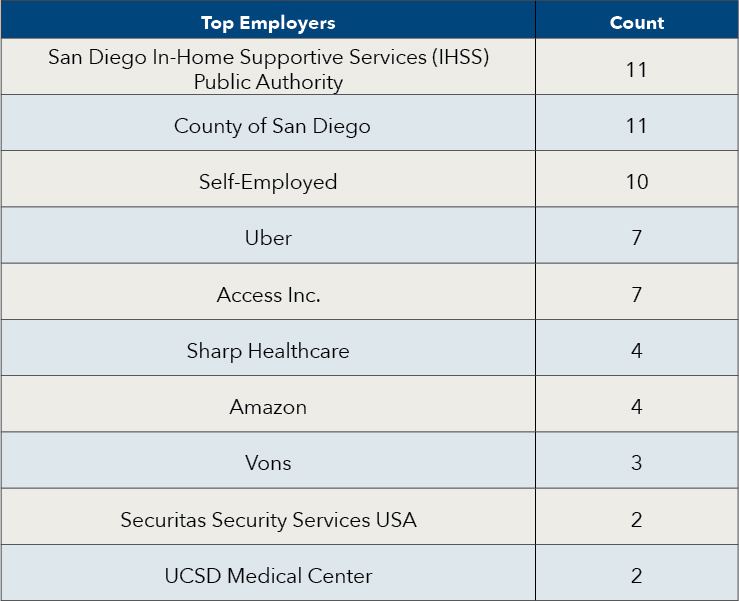RENTAL ASSISTANCE
Thousands of families with low income in the City of San Diego receive help from the San Diego Housing Commission (SDHC) to pay their rent in one of the nation’s most expensive and competitive housing markets. The U.S. Department of Housing and Urban Development (HUD) funds the rental assistance SDHC provides. This is SDHC’s largest program.
SDHC’s Rental Assistance Division also includes the SDHC Achievement Academy, which provides opportunities for families with low income to become more financially self-reliant and improve their quality of life. Additional SDHC initiatives support recruitment and retention of private sector landlords to rent to families who receive rental assistance from SDHC.
Who is Eligible to Receive Rental Assistance?
Households with extremely low, very low, or low income who meet one of the following preferences:
- People who live or work in the City of San Diego
- Active-duty military and veterans
- Seniors ages 62 or older
- Individuals with disabilities
- Individuals experiencing homelessness with a disability
How It Works
- The total rent a landlord charges for a rental housing unit is known as the “contract rent.”
- Rental assistance households pay a portion of their income toward their contract rent. This is known as the “tenant rent portion.”
- SDHC pays the difference between the “contract rent” and the “tenant rent portion.”
- However, the amount SDHC pays cannot be higher than the “payment standard” for the rental housing unit.
- The “payment standard” is the maximum rental assistance payment that a housing voucher would pay for a rental housing unit.
- If the “contract rent” is more than the “payment standard,” the household pays the difference in addition to the “tenant rent portion.”
Fiscal Year 2024
(July 1, 2023 – June 30, 2024)
*Total households that received SDHC rental assistance at any point during the fiscal year. This includes 1,123 Turnover Housing Vouchers and 47 Short-Term Transitional Housing Vouchers.
Rising Costs of Assistance Payments
As rents have consistently risen in the City of San Diego in recent years, the amount of rental assistance SDHC provides also has increased. The dollar amount of the rental assistance payments SDHC disbursed rose approximately 70 percent from FY 2020 to FY 2024 ($166.4 million in FY 2020 to $283 million in FY 2024). The average monthly rent subsidy from housing vouchers also rose steadily during FY 2024.
Housing Voucher Average Monthly Rent Subsidy
July 2023 –June 2024
Housing Voucher Average Monthly Rent Subsidy
By Fiscal Year
SDHC Achievement Academy
Programs that emphasize career planning, job skills, job placement and personal financial education, such as budgeting and credit, are offered at no cost to participants through the SDHC Achievement Academy. SDHC launched this initiative in 2010 with flexibility it receives as a “Moving to Work” public housing agency.
Participants primarily are rental assistance households, residents of affordable housing SDHC owns or manages, and individuals in certain homelessness services programs SDHC operates or administers. However, households with low income throughout the City of San Diego are eligible to participate in SDHC Achievement Academy programs through the SDHC Achievement Academy’s designation as an EnVision Center. This designation is a collaboration with the City of San Diego and San Diego Workforce Partnership.
SDHC Achievement Academy Job Placements
Top Employers and Positions
FY 2024

11
San Diego In-Home Supportive Services (IHSS) Public Authority
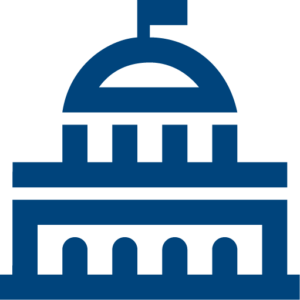
11
County of
San Diego
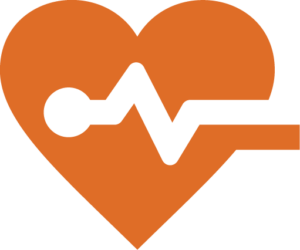
25
Caregiver

15
Driver
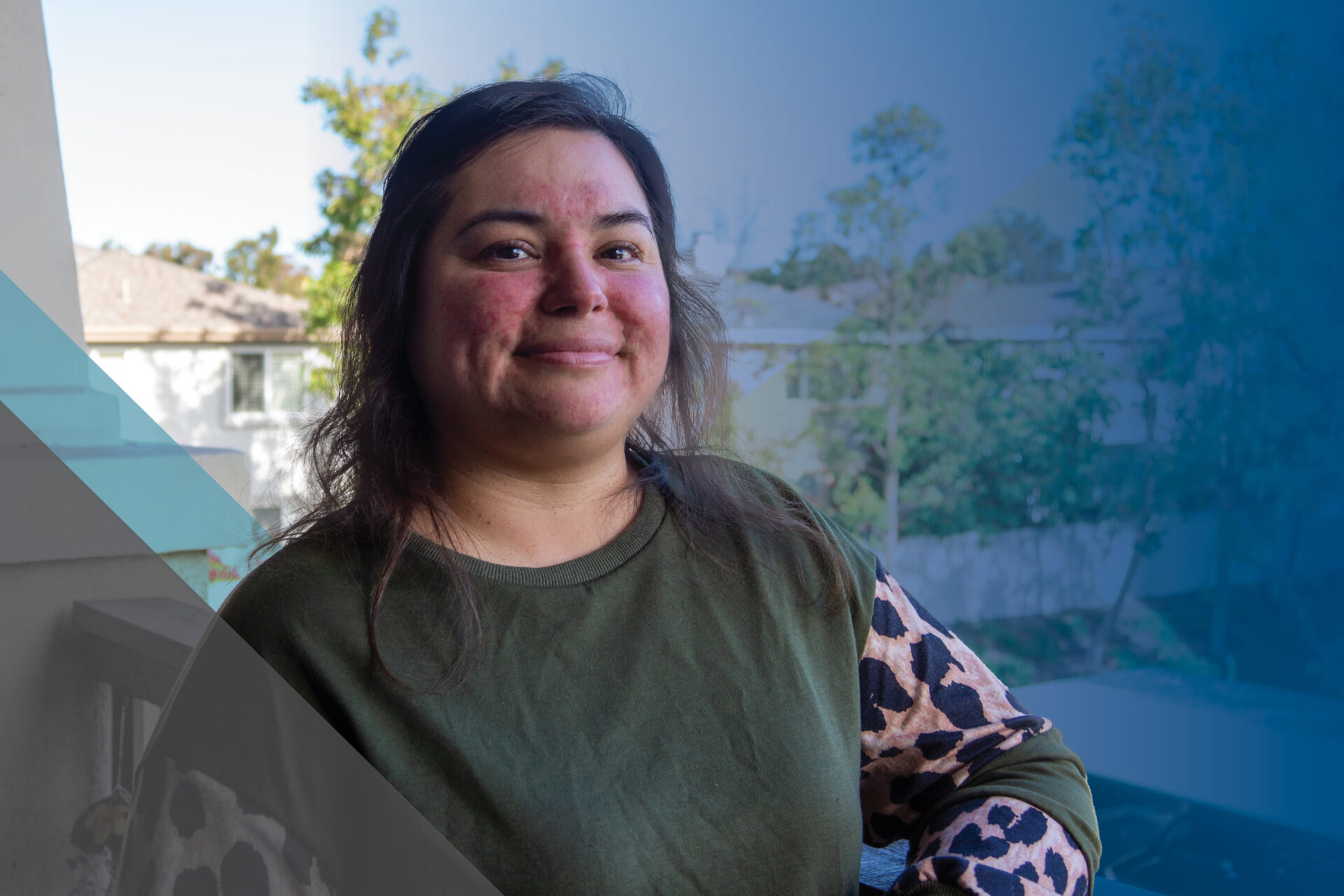
Financial Stability and Opportunity
Priscilla always saw federal rental assistance from SDHC as a temporary solution to help her family when she needed it as a single mother living paycheck to paycheck. Today, with skills she learned through the SDHC Achievement Academy, she has moved forward, starting her own business and no longer needing the rental assistance she received for five years.
“I’m financially stable,” Priscilla said. “I recently got married, so that’s also a plus. My kids are happy too, healthy. I can’t complain. And I’m grateful. I’m grateful to the San Diego Housing Commission that has this program and all the programs that they have. Because without them, I really wouldn’t be here.”
When Priscilla first received her Section 8 Housing Choice Voucher from SDHC, the rental assistance helped her afford to pay utilities, provide for her children and start paying off debt as she worked as an assistant at a property management company.
By the time she no longer needed assistance from SDHC’s housing voucher program, Priscilla had participated in a wide range of SDHC Achievement Academy programs, attending a total of 30 workshops, including small-business classes, professional-development opportunities and financial education classes. She also participated in Power of One, an SDHC Achievement Academy program that provides career and financial planning resources for single parents.
“You do get more than just a voucher from the San Diego Housing Commission. It’s way more than just a voucher,” she said. “It’s an opportunity to grow and opportunity to help your family. … It’s like you have all the tools right there.”
Through the SDHC Achievement Academy, she earned Notary and Certified Nursing Assistant certifications. She also graduated from Family Self-Sufficiency, a program in which participants can earn up to $10,000 in an interest-bearing escrow account as they achieve educational and employment-related goals.
She opened her own consulting business and is one class away from earning a real estate license. She also aspires to launch a second business with her husband, become a homeowner and eventually partner with SDHC as a landlord to help other families.
“Me and my husband want to do a painting business,” she said. “That’s our next goal—just to do our family business and just keep growing from there and just keep pushing and pushing.”
It’s way more than just a voucher. It’s an opportunity to grow.”
—Priscilla
Family Self-Sufficiency (FSS)
Family Self-Sufficiency (FSS) is a voluntary, two-year core program of the SDHC Achievement Academy. Rental assistance participants identified as the “head of household” and household adults who meet certain criteria may participate in FSS.
Participants may earn up to $10,000 in an interest-bearing escrow account as they achieve educational and employment-related objectives. They may use these funds as they wish upon graduation.
To graduate, FSS program participants must achieve all of the goals in their career plan, no longer receive government cash assistance, and work at least 32 hours a week.
Medical Assistant Training Program
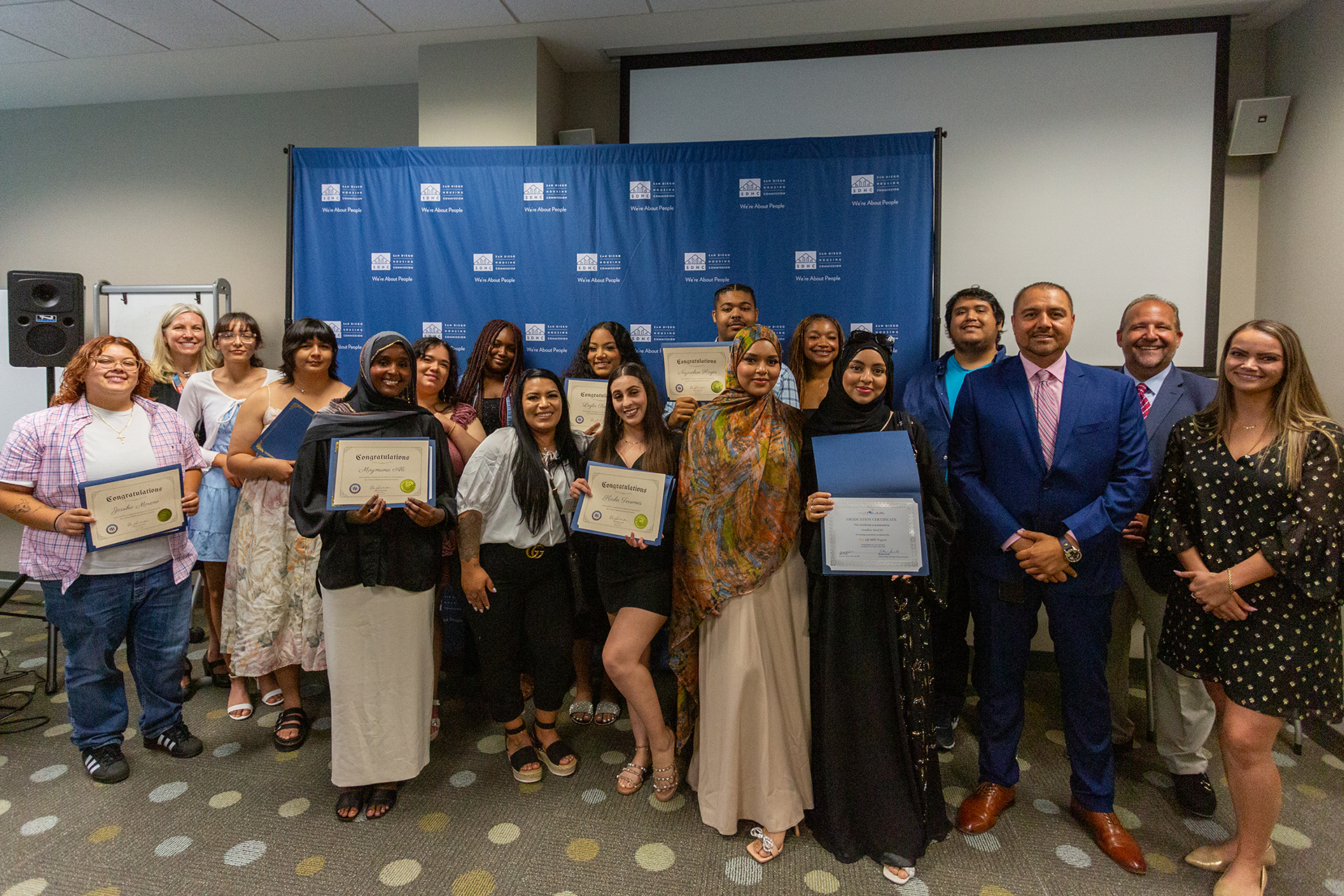
The Healthcare Career Catalyst for Young Adults program launched in Fiscal Year 2024. The first group of 17 participants who completed the program celebrated their graduation on August 22, 2024.
This program provides Certified Medical Assistant training and life skills support at no cost to eligible young adults ages 18 through 26 with low income in the City of San Diego. It is a partnership between the SDHC Achievement Academy, Western Medical Training Center and the International Rescue Committee’s Center for Economic Opportunity. A $604,000 two-year grant from Prebys Foundation funds the program.
The program’s goal is to train 80 young adults (20 young adults in each of four six-month program sessions over two years). The program builds upon an established SDHC Achievement Academy partnership with Western Medical Training Center that has graduated nearly 200 people as Certified Nursing Assistants.
Participants include young adults who have barriers to work and school as well as pressure beyond what is normal for their ages. Some participants also live in underserved communities and have traditionally faced barriers to financial self-reliance.

A Foundation to Make a Difference in Healthcare
Umi is “excited” about her future in healthcare after graduating as a Certified Medical Assistant from the SDHC Achievement Academy’s Healthcare Career Catalyst for Young Adults program.
“I feel like I’m actually making a start in something that’s gonna contribute towards my future,” said Umi, whose family receives rental assistance from SDHC. “Because I feel like, I’m in college right now, and it’s still trying to figure out what exactly I want to do. So, coming out of this program, it feels like I kind of have a foundation to start from.”
Her journey is shaped by her upbringing in Kenya, where healthcare resources are limited, particularly for marginalized communities, she said. Her passion grew when, as a senior at San Diego’s Hoover High School, her family welcomed a baby sister who spent the first couple of months of her life in the neonatal intensive care unit at Rady Children’s Hospital.
Because English is not her parents’ native language, Umi said she became the main point of contact between doctors and her family.
“Every single day going to the hospital translating for my parents, that really exposed me to a different side of the medical field,” she said, “because I was like personally in it and seeing firsthand what the doctors were doing, what the nurses were doing and the kind of experience that they helped us have.”
She heard about the Healthcare Career Catalyst for Young Adults program from her eldest sister, Aisha, who also enrolled. The program is a collaboration among the SDHC Achievement Academy, the Western Medical Training Center, the International Rescue Committee’s Center for Economic Opportunity, and Prebys Foundation, which funds the program through a grant.
Umi particularly enjoyed the program’s lab component, which allowed her to transfer skills learned in textbooks to hands-on experience she can bring to a job someday.
Now a pre-nursing student at the University of San Diego, she said the SDHC Achievement Academy program provided an invaluable opportunity to move her career forward.
She enjoys having contact with patients and is eyeing a career in pediatrics.
“I feel very accomplished,” she said. “I feel I’m actually prepared enough to go into the real world now and apply to jobs as a medical assistant, to go do externships and take everything that I’ve learned in the classroom from my instructors, from my peers, and actually use it in the real life to go make a difference somewhere. And I’m very excited.”
I feel very accomplished. I feel I’m actually prepared enough to go into the real world now.”
—Umi
“I’m a pre-nursing student, so gaining that experience and just working in the hospital field was something major for me. … So, I was just like, this is the perfect opportunity for me to gain my medical assistance certification in a program where everything was being funded.”
-Aisha
SDHC Rental Assistance Participant
Healthcare Career Catalyst for
Young Adults Graduate
“I would like to thank the Housing Commission for being there, for the support. They would give us monthly stipends and gas cards and just that extra help was more motivating to go to class because they were helping us out.”
-Karla
SDHC Rental Assistance Participant
Healthcare Career Catalyst for
Young Adults Graduate
“I just hope to be the best at what I do. I hope that I can like touch people, change people’s lives, and be an influence to people. I wanna leave my mark somewhere, you know, and that’s my goal.”
-Najarehae, “NJ”
EnVision Center participant
Healthcare Career Catalyst for
Young Adults Graduate
Path to Success
For more than 11 years, SDHC’s Path to Success initiative has supported Section 8 Housing Choice Voucher participants and public housing residents in their efforts to become more financially self-reliant.
This initiative changed and streamlined the way SDHC determines the portion of the monthly contract rent that rental assistance families and public housing residents pay. Under Path to Success, families may increase their earnings without immediately paying more toward rent. They can then direct that money to other financial goals.
How it Works
SDHC identifies rental assistance participants and public housing residents as either able to work
(Work-Able) or Elderly/ Disabled.
Work-Able households have a minimum monthly rent payment amount. There is no minimum monthly rent payment amount for Elderly/Disabled families.
Work-Able
A household with at least one adult who is:
- Under 55 during FY 2024 (younger than age 62 starting on July 1, 2024)*
- Not disabled, and
- Not a full-time student ages 18-23
Elderly/Disabled
A household in which all adults are:
- 55 or older during FY 2024 (age 62 and older starting on July 1, 2024)
- Disabled, or
- A full-time student ages 18-23
Rent Payment Amounts
The minimum monthly rent payment amounts for Work-Able households:
- $400 per month for a one-person household
- $650 per month for a household with two or more people
There is no minimum monthly rent payment amount for Elderly/Disabled households.
Example:
A household with two Work-Able adults, each working 20 hours per week at the City of San Diego minimum wage of $16.85 per hour, would earn approximately $2,920 per month. The $650 minimum monthly rent payment amount is approximately 22 percent of this household’s monthly income.
Encouraging Increasing Income
Work-Able families pay either the minimum monthly rent payment amount or the rent payment amount based on the family’s annual income, whichever is greater. Adjusted annual income is separated into income ranges. The lower edge of the range is used to calculate the family’s rent payment.
Example:
One of the ranges for adjusted annual income is $25,000 to $29,999. For any rental assistance family with income in that range, SDHC will use $25,000 as the adjusted annual income to calculate the monthly tenant portion of the contract rent. So a family can earn nearly $5,000 more per year in income without having to pay more toward their rent based on their income.
Hardship Exemption
Families may apply for a temporary hardship exemption from the minimum monthly rent payment amounts. If approved, households then participate in SDHC Achievement Academy work readiness programs for the duration of the hardship period.
Average Household Income Work-Able Families

Landlords
Each year, thousands of property owners and managers rent their housing units throughout the City of San Diego to SDHC’s Section 8 Housing Choice Voucher rental assistance participants. SDHC provides incentives and support to attract and retain private-sector landlords, who are essential to the rental assistance program in San Diego’s competitive rental housing market.
Landlord Partnership Program
SDHC’s Landlord Partnership Program (LPP) provides financial and support incentives to landlords who rent to families who receive federal rental assistance from SDHC.
Incentives and Benefits for Participating Landlords
- Incentive Payments – $500 for each housing unit rented to a Section 8 Housing Choice Voucher household.
- Landlord Assurance Fund – Reimburses landlords up to $5,000 to cover repair expenses that exceed normal wear and tear and rent due that is more than the security deposit. Landlords can submit an online application on SDHC’s website for the assurance fund.
- Move Flexibility Allowance – Five-day Housing Assistance Payment overlap in cases where there is a delay when a voucher-holding household vacates a subsidized rental unit to move into a new unit.
- Mobility Counseling Program – An SDHC Mobility Counselor assists with pre- and post-moving counseling, housing search assistance, and guidance about neighborhood features, and helps to ensure timely lease-ups.
- Security Deposit Loan Assistance – No-interest security deposit loans up to the payment standards for the area for the family’s voucher size.
Landlord Services Unit
SDHC’s Landlord Service Unit consists of dedicated staff that provides quality customer service to landlords and tenants in the federal housing choice voucher program.
This includes a Landlord Liaison, who provides program education, guidance, and support to landlords who rent to program participants, as well as a dedicated team of Mobility Counselors, who support families in the moving process to ensure timely lease-ups.
An Opportunity to Make a Difference
Daniel Fellus’ company acquired Ballpark Apartments in East Village in January 2023 and renamed it Atrium Apartments. Section 8 Housing Choice Voucher rental assistance participants, as well as households with Emergency Housing Vouchers and who receive assistance through the Family Unification Program in SDHC’s Rental Assistance Division, are among his tenants.
I talk to my housing specialists almost every day—very close to a bunch of them. They know us. We know them, and we are here to make an impact. We’re not just here to make the money, which is nice, but we’re gonna make an impact and a difference.”
We’re not Section 8 gurus. We’ve not been doing this for 20-plus years, like many landlords have, but we wanted to find out everything about it. And we had a business model in mind.”
We found what it is and how it’s done, and we learned it. We learned the process from A to Z.”
I think that’s what makes these programs, so successful—to give the resident peace of mind and the landlord peace of mind.”
I would tell the landlords, my advice would be, if they’re a little hesitant or a little reticent about joining or getting involved in housing—I mean Section 8, LEAP, whatnot—learn about it. Find out. Go. Don’t be afraid.”
– Daniel Fellus, Landlord



